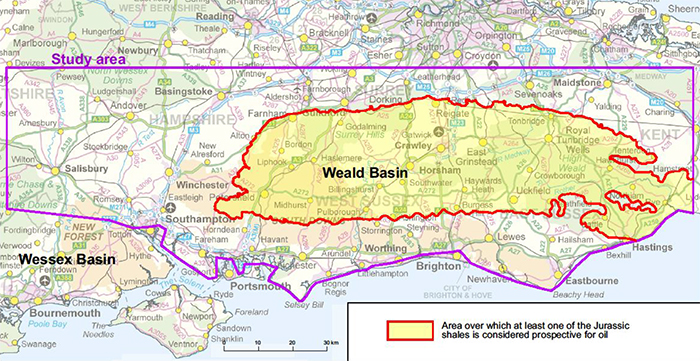Jurassic Shale of the Weald Basin: resource estimation
23/05/2014 By BGS Press
The British Geological Survey (BGS) in association with the Department of Energy and Climate Change (DECC) has completed an estimate for the amount of shale oil and shale gas in the Weald Basin in south-east England. The estimate is in the form of a range to reflect geological uncertainty. The range of shale oil in place is estimated to be between 2.20 and 8.57 billion barrels (bbl) or 293 and 1,143 million tonnes, but the central estimate for the resource is 4.4 billion bbl or 591 million tonnes. No significant gas resource is recognised using the current geological model. This is mainly because the shale is not thought to have reached the geological maturity required to generate gas.
The figure for oil represents the total amount of oil present in the rocks. It is not known what percentage of the oil present in the shale could be commercially extracted. In order to estimate the shale oil reserve, drilling and testing of new wells will be required to give a better idea of oil production rates. In addition, non-geological factors such as oil price, operating costs and the scale of development agreed by the local planning system will affect the amount of oil produced.
Shale oil clearly has potential in Britain but it will require geological and engineering expertise, investment and protection of the environment. It will also need organisations like the BGS to play their part in providing up to date and accurate information on resources and the environment to the public, industry and Government.
For further details or to arrange media interviews please contact:
Sarah Nice, BGS Press Office, Keyworth, Nottingham, NG12 5GG
Office: +44 (0)115 936 3605 Mobile: +44 (0)7989 115657
E-mail: sebr@bgs.ac.uk Twitter @Sarahnice1
Clive Mitchell, BGS Press Office, Keyworth, Nottingham, NG12 5GG
Office +44 (0)115 936 3257 Mobile: + 44 (0)7815 537 439
Email: cjmi@bgs.ac.uk Twitter @CliveBGS
The following are available for interview:
- Mr Bob Gatliff, British Geological Survey
- Mr Ed Hough, British Geological Survey
- Dr Rob Ward, British Geological Survey
For additional information go to: www.bgs.ac.uk/shalegas
Photographs are available from our ftp server: ftp://ftp.bgs.ac.uk/pubload/bgspress/shalegasresource/WealdSouthEastEngland/
Free for media use with this acknowledgement: British Geological Survey©NERC
The British Geological Survey
The British Geological Survey (BGS), a component body of the Natural Environment Research Council (NERC), is the nation’s principal supplier of objective, impartial and up-to-date geological expertise and information for decision making for governmental, commercial and individual users. The BGS maintains and develops the nation’s understanding of its geology to improve policy making, enhance national wealth and reduce risk. It also collaborates with the national and international scientific community in carrying out research in strategic areas, including energy and natural resources, our vulnerability to environmental change and hazards, and our general knowledge of the Earth system. More about the BGS can be found at www.bgs.ac.uk.
The Natural Environment Research Council
The Natural Environment Research Council (NERC) is the UK’s main agency for funding and managing world-class research, training and knowledge exchange in the environmental sciences. It coordinates some of the world’s most exciting research projects, tackling major issues such as climate change, food security, environmental influences on human health, the genetic make-up of life on earth, and much more. NERC receives around £300 million a year from the government’s science budget, which it uses to fund research and training in universities and its own research centres. www.nerc.ac.uk


